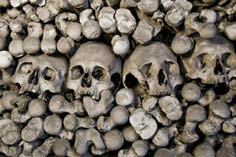
The intermediate state is the state in which the dead are until the resurrection of the body. Depending on the interpretation of the relevant scriptures, Christians have different views about the nature of this intermediate state. Some passages suggest that the dead experience this state consciously, others that their consciousness is extinguished. The Worldwide Church of God believes that both views should be respected. (Isaiah 14,9-10; Ezekiel 32,21; Luke 16,19-twenty; 313,43; 2. Corinthians 5,1-8; Philippians 1,21-24; epiphany 6,9-11; psalm 6,6; 88,11-twenty; 135,17; preacher 3,19-21; 9,5.10; Isaiah 38,18; John 11,11-14; 1. Thessalonians 4,13-14).
In the past we used to take a dogmatic stance regarding the so-called "intermediate state," that is, whether a person is unconscious or conscious between death and resurrection. But we don't know. Throughout Christian history, the majority view has been that after death man is consciously with God or consciously suffers punishment. The minority opinion is known as "sleep in the soul".
When we examine Scripture, we see that the New Testament does not offer a reassuring view of the intermediate state. There are some verses that seem to indicate that people are unconscious after death, as well as some verses that seem to indicate that people are conscious after death.
Most of us are familiar with verses that use the term "sleep" to describe death, such as those in the book of Ecclesiastes and the Psalms. These verses are written from a phenomenological perspective. In other words, looking at the physical phenomenon of a dead body, it seems that the body is asleep. In such passages, sleep is an image for death, relating to the appearance of the body. However, if we read verses like Matthew 27,52, John 11,11 and Acts 13,36 reading it seems that death is literally equated with "sleep" - although the authors were aware that there is a significant difference between death and sleep.
However, we should also pay serious attention to the verses that indicate post-death consciousness. In 2. Corinthians 5,1-10 Paul seems to refer to the intermediate state with the words "undressed" in verse 4 and as "being at home with the Lord" in verse 8. In Philippians 1,21-23 Paul says that dying is a "gain" because Christians depart from the world "to be with Christ". This does not sound like unconsciousness. This is also seen in Luke 22,43, where Jesus says to the thief on the cross: "Today you will be with me in paradise." The Greek is clearly and correctly translated.
Ultimately, the doctrine of the intermediate state is something that God chose not to accurately and dogmatically describe to us in the Bible. Perhaps it is simply beyond human ability to comprehend, even though it could be explained. This teaching is certainly not an issue over which Christians should quarrel and divide. As the Evangelical Dictionary of Theology states, "Speculations about the intermediate state should never belittle the certainty of the cross or the hope of the new creation."
Who would want to complain to God when after death they are with God fully conscious and say, "I'm supposed to be asleep until Jesus returns - why am I conscious?" And of course, when we're unconscious, we will not be able to sue. Either way, in the next conscious moment after death, we will be with God.
by Paul Kroll
This website contains a diverse selection of Christian literature in German. Translation of the website by Google Translate.